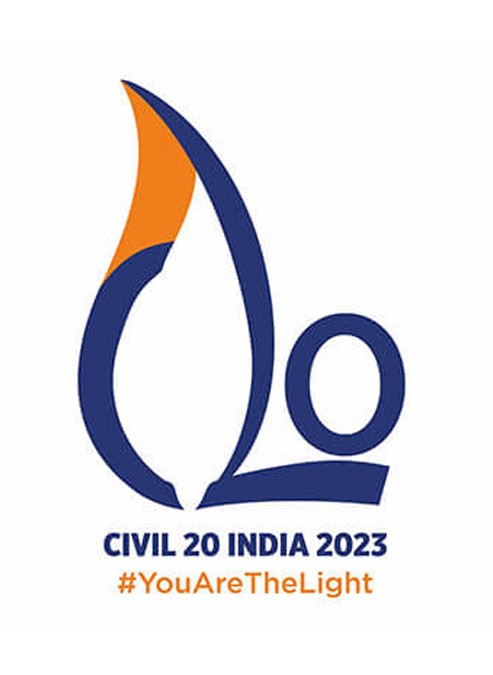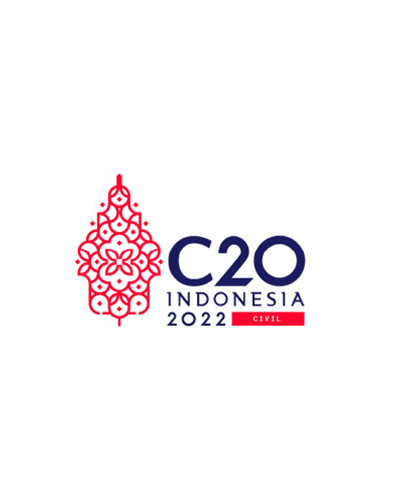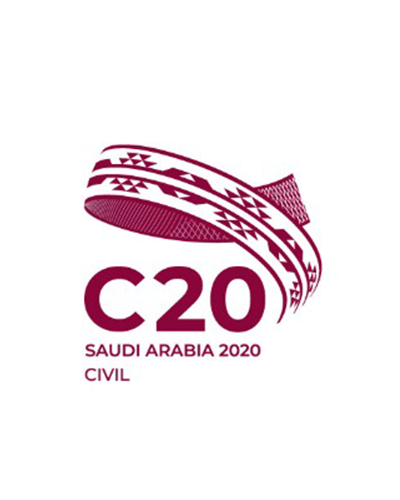Civil 20 (C20) was made official as an Engagement Group of G20 in 2013. Since then, C20 has grown stronger every year, ensuring that world leaders listen to the recommendations and demands of the organized civil society, looking to protect the environment and promote social and economic development, human rights and the principle of leaving no one behind.
As part of the G20 process, C20 plays multiple roles, including but not limited to: providing expertise and holding governments accountable to their commitments; seeking positive outcomes for society as a whole and; pushing for an effective financial means and allocation of resources to achieve those outcomes.
C20 can also provide balance, considering that one of the G20’s greatest weaknesses, based on evidence, has been granting civil society the same level of access as it provides to business interests. In a context where people around the world believe that governments are too close to businesses or only act in their own interests, it is vital to involve civil society to ensure that government decisions reflect the interests of citizens and are worthy of people’s trust.
Undoubtedly C20 is a major contributor to the G20 process given that, besides acting as a guardian, civil society is the home of innovators and experts on technology, sustainable development, gender equality, climate emergency, health, education and in all G20-related themes, being able and always ready to provide cutting-edge solutions, innovative ideas to G20 governments on the key issues of our time.
C20 Principles
During the C20 Summit in Tokyo (2019), more than 800 civil society representatives from all over the world approved principles in order to provide a general framework for all subsequent engagement by the C20 to ensure the sustainability and increasing impact of our collective work.
One of the C20 governance commitments is to preserve and implement these principles, ensuring their observance by all people who participate in the process.
Global character: C20 is the global space for civil society organizations and social movements from all over the world – from international NGOs to grassroots local groups – aiming to influence the G20. Any local, regional or international organization (whether from G20 or non-G20 countries) is welcome to participate in the C20. A regional balance should always be ensured.
Transparency: All preliminary and working drafts of C20 pronouncements or decisions should be circulated widely among participating organizations and opened to comment, and all final documents should be made widely available and accessible. Information regarding C20 leadership, structure, procedures, and outputs should always be timely, relevant, up-to-date and accurate. All C20 outputs must be developed through a transparent, inclusive and participatory process, to provide participating CSOs the opportunity to collaborate in drafting policy recommendations, including the cover statement of the C20 Policy Pack.
Independence: While welcoming input and open debate, ultimate decision-making and sign-off prerogatives on C20 positions belong to C20 member organizations. The C20 is the exclusive domain of civil society, mandated to carry out its work and develop its policy recommendations autonomously, that is, free from undue influence by any non-civil society actors.
Collaboration: To address issues of common interest, C20 is encouraged to cooperate with other engagement groups looking to enhance the impact of the C20’s work. Such cooperation must be based on balanced power relations, adequate consultation among C20 members and thorough discussions among all C20 structures.
Human Rights, Gender Equality and women’s empowerment: C20 opposes existing inequalities, forms of discrimination and all human rights violations. Gender equality is a fundamental human right, it is essential for promoting sustainable development and achieving the Sustainable Development Goals (SDGs).
Inclusiveness: C20 is a space for meaningful exchange and cross-country collaboration, which does not tolerate any form of discrimination, including those based on geographic location, gender, gender identity, sexual orientation, race, caste, language, age, ability, legal status (e.g., migrant, refugee and statelessness), ideology, religion or political belief.
Besides, since 2015, the C20 has aligned with the UN 2030 Agenda for Sustainable Development’s motto “Leave No One Behind” which emphasizes that development must be inclusive and equitable and that no one should be left behind in the pursuit of sustainable development.
Continuity: Although the overall themes and priorities of the C20 may vary from year to year, all C20 processes should be guided by the aim of reflecting the perspective and experience of civil society across a diverse range of topics, including those which civil society wants the G20 to address but are not currently on the G20 agenda. For that to happen, each C20 process should always build on its predecessors and ensure that the voices and experiences from different parts of the world are considered. The C20 structure outlined in section B is viewed as essential for maintaining this continuity.
Predictability: To contribute to the transparency of the C20, it is crucial to have clear schedules and processes in place that outline a step-by-step approach for every deliverable/product that will be produced for publication on behalf of the C20.
C20 Governance
To ensure participation, transparency and continuity, C20 work is driven by a governance structured by the following spheres:
C20 Troika: The Troika structure allows for dialogue and coordination between the leading civil society organizations from the current, previous and following G20/C20 host countries.
C20 Chair and Co-Chairs: Responsibles for facilitating the C20 process, representing C20, structuring the Secretariat, choosing the C20 Sherpa, making pronouncements and dialogue with other actors involved in G20.
C20 Sherpa: Chosen each year by the Chair and Co-Chair, the C20 Sherpa is the main point of contact with external stakeholders (G20 representatives, international organizations, media, and other G20 engagement groups). Together with the Chair is also responsible for ensuring a fluent and effective dialogue among C20 Working Group Chairs, mainstreaming relevant areas of work and developing the C20 schedule, for approval by the SC and the IAC.
C20 Secretariat: Responsible for the administrative, financial and logistical coordination tasks.
International Advisory Committee (IAC): Composed by representatives of international CSOs with experience working within G20, the IAC’s main roles are to advise the Chair, the Sherpa and the Steering Committee on strategic decision-making and contribute to disseminating C20 recommendations among key stakeholders.
C20 Steering Committee (SC): It is the executive body responsible for ensuring that the C20 is an open and diverse space that facilitates a broad range of civil society views of the G20. It leads the production of recommendations, ensures the C20 Working Groups meet regularly among themselves and with government representatives and helps coordinate the agendas for C20 meetings. The SC works alongside and is advised by the International Advisory Committee.
The SC and the IAC are composed of CSOs with expertise in various areas of C20 engagement, invited by the Chair and Co-Chair based on two major criteria: experience of working at C20/G20 level, and geographic and thematic representation. It must consider regional and gender balance, with attention given to the representation of marginalized and underrepresented groups.
To ensure continuity in the IAC and SC, at least two members in each body should stay on from the previous cycle. At the same time, the principle of rotation should be applied to both the SC and IAC, with members serving beyond three consecutive years only in exceptional circumstances. Communication must be fluid between Co-chairs, Sherpa, SC and IAC for decision-making on strategic and key issues.





